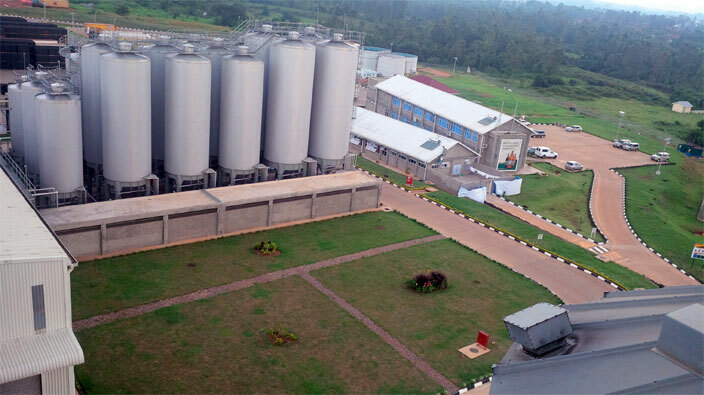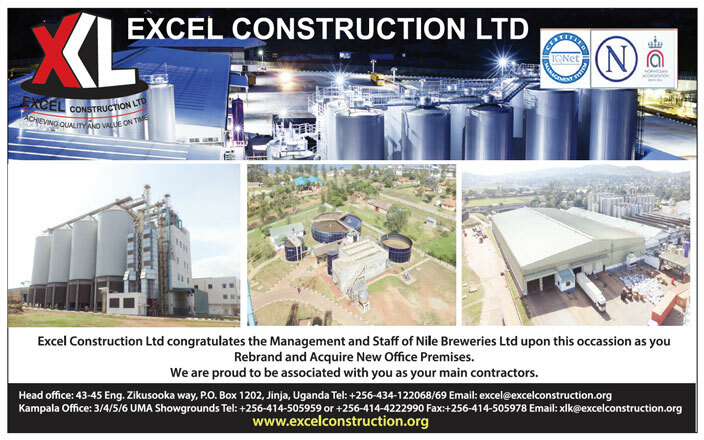Nile Breweries LTD supplement
NBL soars above and beyond
By Jacquiline Emodek
Nile Breweries Limited, Uganda’s leading brewery has changed its corporate identity. Corporate identity is the manner which a corporation, fi rm or business presents themselves to the public which comprises customers, investors as well as employees.
The new corporate identity stems from the fact that NBL does a lot more than producing beers; the company does a lot of community work among which is the Eagle project and Corporate Social Investment.
Above and Beyond describes who NBL is as a company and what it is trying to do. In order to refl ect this, the new corporate identity is characterised by colours representing beer — the main product the company produces.
It also has sunlight reflecting on the River Nile and River Rwizi in Mbarara where the company’s breweries are located. The new corporate identity also uses unique angles which show subtle waves of water to refl ect its heritage and natural colours to show its commitment towards preserving nature and the environment as a whole.
Reasons for change
NBL’s current corporate identity has been around since 1951. People have been identifying the current logo with a company that is fi ghting for a fruit share in the market. They looked back at the days when they were a small rural company fighting for a place. Those days are transformed.
They are now market leaders Consequently, the company’s focus is more on how it can become a leader in the market and less about simply gaining market share Nile Breweries is the number two tax payer in Uganda $29m expansion of the Jinja brewery in 2009 $25.6m malting and effl uent treatment plant projects in 2011 $90.6m Mbarara brewery investment Supporting 20,000 farmers in Uganda through the company’s value chain KEY MILESTONES from its competitors.
 The new brewery located on the banks of River Rwizi in Ruharo, Mbarara district
The new brewery located on the banks of River Rwizi in Ruharo, Mbarara district
The questions asked are; How can we lead in job creation, how can we lead in investment and how can we lead in innovations. Notably, NBL already plays an impressive role in all the questions it seeks to answer. For example, it has led brand innovations like Club Twist, Club Shorty, Eagle Darks among others.
The company is also a leader in locally sourcing raw materials through its eagle brand and has led investments like the establishment of a new brewery in Mbarara which has fostered job creation. “We are proud of where we stand as a company.
We see ourselves as a brewery that is modern and progressing while creating a difference in Uganda’s society and economy as a whole.” This growth had to be marked and so the company devised a new corporate identity to reflect this.
Presently, the lion is more rigorous and looking forward thereby reinforcing its dominant position and progression respectively. The entire composition of the brand is modern and progressive.
History
Nile Breweries Limited’s story began in 1951 with the establishment of a single brewery in Jinja district by a group of business men who where involved in the construction of Owen Falls Dam. Madhvani Group bought NBL in 1957 and run its day to day operations until 1972 when former president of Uganda Idi Amin expelled Asians from Uganda.
Following the expulsion of Asians, Amin nationalised the brewery. The brewery operated as a state enterprise until 1992 when the Government divested itself under the privatisation programme; NBL was returned to Madhvani Group. In 1997, South African Breweries (SABMiller PLC) the second largest brewer in the world, bought a 40% stake in the brewery.
This was eventually raised to full ownership in July 2001 thereby transforming the brewery into a world class operation. Today, the plant produces a total capacity of 1.8 million hectolitres of beer. In 2011, NBL undertook a study to ascertain whether it should increase its capacity.
The options were either expanding the Jinja plant or establishing a Greenfield brewery at a distinct location in Uganda.
Mbarara plant
The company chose the latter and Mbarara district was identifi ed as the ideal location for a new brewery because of its status as a major transport hub for the region and its impressive infrastructure.
After an intensive search for land, NBL settled for land in Ruharo because of its location on River Rwizi which provides a reliable source of water. Works on the Mbarara brewery which cost $90.6m were completed in 2013. President Yoweri Museveni launched the plant in August 2013 with an initial capacity of 650,000 hectolitres of beer per annum, expandable to 1.8 million hectolitres.
The new brewery uses sorghum, maize and barley grown mostly by farmers in the region. Not only are the products marketed locally, but also exported to South Sudan and Democratic Republic of Congo.
Head office
With the expansion to Mbarara district, NBL shifted its head offi ce from Jinja to PortBell Road, a more central location in Kampala. The head offi ce complex houses the company’s top executives as well as employees of the procurement, corporate affairs, finance, marketing as well as sales and distribution departments.Head office With the expansion to Mbarara district, NBL shifted its head office from Jinja to PortBell Road, a more central location in Kampala.
The head offi ce complex houses the company’s top executives as well as employees of the procurement, corporate affairs, finance, marketing as well as sales and distribution departments.
|
KEY MILESTONES Nile Breweries is the number two tax payer in Uganda $29m expansion of the Jinja brewery in 2009 $25.6m malting and effl uent treatment plant projects in 2011 $90.6m Mbarara brewery investment Supporting 20,000 farmers in Uganda through the company’s value chain |
